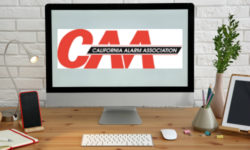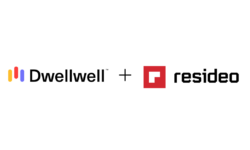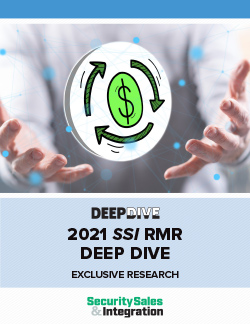Security Industry Forecast: Experts Chime in, Sharing Expectations for 2024 and Beyond
From security industry growth areas to segments that could struggle, our prognosticators share thoughts on how security could transform.

Adobe Stock image by Lukasz
What’s getting better about the security industry these days? What seems to be getting worse?
Barnette: What’s improved in the security marketplace is that security is no longer an afterthought…. What’s getting worse is that customers still treat security as a secondary system once installed. Meaning, if it ain’t broke, don’t fix it.

Paul Boucherle
Paul Boucherle, founder and principal of Matterhorn Consulting LLC: What is getting better is that the next generation of existing company leadership, as well as new solution/technology entrepreneurs, are more innovative, less risk-averse, and adapt [and] embrace change…. What is getting worse is the security industry’s resistance to changes, [difficulty] adapting to fast-moving technology, and resistance to new, innovative thinking.
Carlson: Best-in-class integrators seem to be focused on building long-term relationships with end users, through which they might provide value in a more integrated partnership with a focus on quality…. One significant hurdle I’ve seen the industry struggle to overcome has been the pace of the growth of AI and other intelligent technologies.

Clint Choate
Choate: Better: More cloud-based product and services adoption. Worse: Labor shortage is an area where we continue to see challenges.
Clark: The adoption of proactive security approaches is improving, with a shift in perspective to not only keeping unauthorized individuals out but also enhancing the daily experiences of employees…. [On the negative side], while measures to improve cybersecurity have improved, the frequency and nature of attacks have yet to.
Cowan: The technology manufacturers are creating — especially AI. It’s amazing to see how quickly it can adapt and be modified for different end users. But on the other side of the coin, a lot of integrators are putting AI and other new technologies in front of their customers, hoping a solution will emerge.
Faenza: Getting better: More cost-effective and easier-to-install and -integrate solutions are helping expand the reach of intelligent access control technologies that provide real-time or near-real-time monitoring, audit trails for greater accountability, and more protection for more openings and the assets inside their doors. On the downside is the commoditization of security technology.
Giacalone: Many new technologies and platforms continue to increase the value proposition offered and available to the market. Although many progressive companies seem to demonstrate an ability to pivot and adopt these new technologies, many still stand firm and, unfortunately, will be left behind.

Felix Gonzales
Gonzales: We’re excited to see diversity become a cornerstone for many businesses in the security field.
Hall: Better: Diversity of products and convergence across categories; more sophistication across products and more opportunities for advanced functionalities/service agreements. Worse: With more product categories than ever and evolving best practices, it’s becoming more challenging for dealers to remain competitive and deliver on customers’ expectations.
James: The industry is getting smarter, with more analytics, plus AI, which means the systems are better equipped to provide smarter solutions. Residential systems are going to a DIY approach. And if your business is focused in this area, it will likely continue to shrink.
Loud: What’s getting better is the technological advancements and integrated solutions we can offer our customers. What’s getting worse is the fact that we have an aging population in our workforce.
MacDowell: Security is no longer an afterthought in planning. This is true in commercial and residential sectors. What is getting worse? We continue to have a gap to fill in attracting talent in all areas of the industry.

John Nemerofsky
Nemerofsky: More compliance, such as SOC 2, is making us better as an industry with more certifications, such as security project management, security cyber certifications and ODP.
Niles: Products are becoming increasingly advanced, and solutions are now prioritizing the desires and requirements of end users, rather than solely being driven by what security companies are willing to offer. Aggressive sales tactics, along with an escalation of scams, are rampant and worsening daily. If left unchecked, these negative business practices could tarnish the reputation of the security industry.
O’Brien: The growing diversity in the industry is a phenomenal change and something that should only continue to make our industry stronger.
Parks: Boosting monthly revenue through add-ons like smart doorbells, cameras and locks shows great promise. Remote support for these devices adds to this positive trend, enhancing both efficiency and customer satisfaction. In addition, the ability to troubleshoot remotely helps reduce truck rolls. Banks’ willingness to work with security companies in the residential market is decreasing, creating a more challenging market, especially for dealers more invested in residential security.
Reynolds: I’ve seen several individuals — manufacturers and integrators alike — take advantage of renewed interest in physical security technology to expand their portfolios, attract new business and, in the end, make a buck instead of helping end users design systems that are built to last. To put it plainly, trunk slammers and snake oil salesmen abound. On the other side of this same coin, however, this environment has made it so that the professionals who go above and beyond stand out now more than ever.

Jeremy White
White: For us, scalability is the biggest benefit AI provides. But for integrators, dealers and end users, it’s all about the services…. The biggest challenge in the security industry today continues to be finding qualified talent.

Adobe Stock image by MangKangMangMee
What’s liable to catch some security dealers, installers and integrators off guard in the coming year?
Barnette: The change in business from a large system sale to a cloud-based subscription model or managed service will continue to accelerate in the market. Most companies have not embraced the change, and this will ultimately impact their financials.
Boucherle: The importance of cybersecurity disciplines in their business dealings. Also, the exponential growth of threat vectors and vulnerabilities as new technologies arrive. [These may threaten] those who are unprepared to acknowledge and address aggressive, well-funded, sophisticated hackers [who are] intent on stealing data and intellectual property and holding companies hostage. Standards driven by the federal government will influence commercial/industrial businesses way beyond just doing business with government entities.
Butkovich: Some may not be aware that the AVS-01 Alarm Scoring Standard was approved last year and [is] being implemented throughout 2024 by monitoring stations and ECCs.
Carlson: We’ve seen non-traditional players coming to market with their approach to physical security and service solutions, including larger MSPs. We expect them to start competing for business with the convergence of new tools, AI, cloud and the convergence with cybersecurity.
Choate: Between Bosch exiting the space and the vast number of independent access control companies, integrators should be prepared to be adaptable to changing product offerings and services resulting from changes in the space.
Clark: The unpredictable real estate market will impact the physical security industry…. In addition, the rapid pace of technological advancements can catch professionals off guard if they fail to stay abreast of the latest developments. Emerging technologies such as AI may evolve quickly, and failure to adapt could result in missed opportunities or outdated service offerings. Changing customer expectations and demands are also [things] that professionals need to stay on top of, so they aren’t caught off guard. Clients may seek more integrated, holistic solutions beyond traditional security measures.
Cowan: A lot of security integrators are going to wake up in 2024 and start to see manufacturer services, which were once provided as a part of doing business, now as a line from those same manufacturers.
Faenza: Integrators who are behind on keeping up with the constantly evolving security landscape, the digitalization advancements in technology and recognizing how critical interconnectivity among systems is may be caught off guard, lose out on projects and miss growth opportunities.

Peter Giacalone
Giacalone: Some of the new technologies are disruptive and very different on many levels. I also believe some financial models may shift, and those who don’t adapt may find themselves in challenging situations.
Gonzales: Any time client engagement is not top of mind, you’re liable to be caught off guard.
Hall: Customers expect fully connected ecosystems in smart homes and commercial markets. If dealers are not prepared to deliver on these changing demands, they might be caught off guard.
James: The rising cost of money and end users paying slowly.

Judy Jones
Judy Jones, VP of marketing for NAPCO Security Technologies: New data channel security and their liability exposure may catch dealers off guard. While it’s high time and essential that the security industry’s reliance on wiring and POTs landlines is literally coming to an end — and digital communications and cloud-based, hosted data are now widely accepted solutions in security — it brings to bear a new dealer concern: liability. Dealers/integrators need to double-check that their security solutions, especially life-safety commercial fire solutions, are UL Listed end-to-end. (NAPCO communication solutions are all UL 864 Listed end-to-end.)
LeBlanc: The problem that our members are telling us about is that it feels like they’re taking people out of the field and putting them through training but [that] the technologies and needs are evolving so quickly that it feels like they’re taking productive people out of the rotation so they can get trained on something that will be outdated before long.
Loud: We’re entering into an election year, which inevitably brings economic uncertainty. That means security integrators should be thinking and doing what they can to prepare for a volatile market. High interest rates could potentially catch people off guard, and so, as the old saying goes, “Cash is king.” You want to do what you can to be as cash heavy as possible.
MacDowell: With the fast-paced continuous development of AI, integrators should watch what federal, state and provisional governments are implementing that might impact their business. The best way to combat this is to join and engage with national associations, such as ESA, SIA, TMA and CANASA. [These associations] monitor legislation on a continuous basis on behalf of their members.
Nemerofsky: More and more clients are demanding your SOC 2 compliance now. With privacy and cyber being at the forefront of so many cloud deployments, integrators and dealers need to prepare.
Niles: I observe a growing trend of acquisitions resulting in the decline of smaller regional businesses — commonly referred to as “mom and pop” companies — and the rise of larger, nationwide corporations within the industry.

Aiden O’Brien
O’Brien: The need to properly onboard and retain talent is only going to be more important in a tight labor market.
Parks: The security market faces ongoing challenges due to the persistent high costs of materials and shipping, as well as difficulties in recruitment. Additionally, the market’s fragmentation and complexity often catch players entering the market off guard. The escalating costs associated with acquiring new subscribers further compound these challenges.
Reynolds: While this has already been a trend, I suspect it will continue to surprise many of us as manufacturers purchase and incorporate other manufacturers.
White: Those who aren’t adopting the newer technologies are going to be caught off guard. They don’t have the tools to compete.
What’s the single most pressing issue that professionals in the security industry should look to tackle right now?
Barnette: As industry professionals continue to age out, we need to do more to recruit a diverse group of people into this space. [Otherwise], we will lag other industries competing for talent.
Boucherle: Business continuity and resilience risks that remain on the back burner with the attitude that “it will never happen here.”
Carlson: Figuring out how to leverage AI 1) to run their business more efficiently and 2) when consulting and guiding their customers on the use of the technology.
Choate: The security industry needs to invest in new technologies and training programs that are designed to appeal to, and retain, millennials and Gen Z workers.
Clark: The sheer amount of data from so many devices is overwhelming. Businesses need to aggregate and adopt predictive analytics to anticipate potential issues before they occur.
Cowan: From technology developers inside manufacturers’ headquarters down to the installers at customer locations, the security industry needs to figure out how to retain talent.
Faenza: Developing broader expertise.
Giacalone: Those who are in the monitoring business must address false alarm reduction simultaneously with providing enhanced security monitoring.
Gonzales: We must think about how AI can be leveraged in terms of how our clients are approaching this technology and how we can support them.
Hall: Customers expect customized, state-of-the-art solutions, and dealers must respond by evolving their portfolios to be more competitive, versatile and interoperable. They must also understand how to deliver seamless integration across all technologies to ensure maximum system performance.

Brian James
James: More systems will live in or be managed in the cloud. They should ask themselves how they will adapt to this.
Kohl: The industry needs to work together to brand our industry as a high-tech field that offers rewarding careers — where someone with limited experience can grow from an entry-level installer to become a highly skilled knowledge worker who will be designing, configuring and servicing advanced technologies that are powered by AI, cloud solutions and other tech trends.
Loud: The aging workforce stands as the most pressing issue confronting professionals within the security industry today.

Kirk MacDowell
MacDowell: Retaining employees/customers and reserving cash, in that order.
Nemerofsky: Workforce development. Retaining and recruiting, while building an empowered culture.
Niles: The growing presence of the IT industry and other DIY companies in the camera business is on the rise. However, a significant concern arises from the fact that these entities may lack proper licensing and, at times, fail to adequately train customers on the functionality of their products.
O’Brien: Our industry needs to ensure that diverse viewpoints are being considered at the company level. The industry is aging. We need to look toward the future and empower future leaders and their career development.
Parks: Grasping the modern consumer’s behavior and their purchasing journey is crucial for the security industry…. It’s essential to broaden [security professionals’] messaging to encompass not just security but [also] a comprehensive technological experience within the home, driven by context, notifications and relevant information.
Reynolds: Failing to [keep] pace with the growth of AI-enabled solutions can mean creating gaps in physical and cybersecurity infrastructure, leaving end users vulnerable to bad actors.
White: It all goes back to staffing. As security dealers and integrators look to offer the latest and greatest solutions on the market, the right talent is needed to do so effectively.
Finish this sentence: 2024 will be remembered as the year that the security industry…
Barnette: …evolved from a construction-based business to a managed services business.
Boucherle: …discovered how AI software helped or hurt their business.
Butkovich: …redefined public safety partnerships by delivering AVS-01 Alarm Scoring to improve alarm activation outcomes, with priority response to alarm signals based upon presence, threat to property and threat to life.
Carlson: …leaned into using business software and technology to more effectively collaborate and scale the finite talent that they had, in order to capitalize on the demand and opportunity.
Choate: …made cybersecurity and networking a standard core offering.
Clark: …embraced centralization.
Cowan: …worked harder than ever to prioritize consistent revenue bases across its layers of business.
Faenza: …became recognized [as] more vital and valuable than ever in helping to overcome cybersecurity vulnerabilities, prevent unauthorized entry and confront threats of violence.
Giacalone: …spread its wings and broadened [its] approach to services that reach beyond traditional security and safety.
Gonzales: …took a more prominent place in business operations.

Randy Hall
Hall: …broke free from any remaining silos and became an invaluable part of the fully integrated end user experience.
James: …continued its journey toward intelligent cloud-based systems.
Loud: …continued to thrive, even during uncertain economic times, by leveraging a strong recurring revenue base.
MacDowell: …was in sync [with the idea] that well-managed RMR, in any fashion that is appropriate to the integrator and the consumer, not only is what the consumer desires but [also] will significantly drive company values.
Nemerofsky: …was rebranded as Sec Tec: the security technologies industry.
Niles: …fully embraced AI and implemented it in ways that not only allowed security companies to provide better protection to their clients but also dramatically reduced false alarms and unnecessary police dispatches.
O’Brien: …stopped waiting for talent to find us.
Reynolds: …finally caught up to the pace of innovation in related industries.
White: …saw the generally wide adoption of all the latest technologies, including AI and SaaS solutions, over hardware sales.
If you enjoyed this article and want to receive more valuable industry content like this, click here to sign up for our FREE digital newsletters!

Security Is Our Business, Too
For professionals who recommend, buy and install all types of electronic security equipment, a free subscription to Commercial Integrator + Security Sales & Integration is like having a consultant on call. You’ll find an ideal balance of technology and business coverage, with installation tips and techniques for products and updates on how to add to your bottom line.
A FREE subscription to the top resource for security and integration industry will prove to be invaluable.









In my view our industry is technically challenged by cyber-attacks, unless we begin using more advanced technology (ie: faster microchips, etc.) in order to protect our systems from those attacks; our microcontrollers are the most vulnerable technologies that uses mostly chips that are not capable to sustain those attacks, especially now that we are moving towards that cloud. I foresee that with the advent of quantum computing, which is her now to stay our industry will have major complications, especially in the areas of adapting to the real AI, etc. First the manufacturers need to create microcontrollers with two factor authentication, also IT experts needs to understand our world of OT; which are quite different. In summary we need to accept our new reality of transformation.